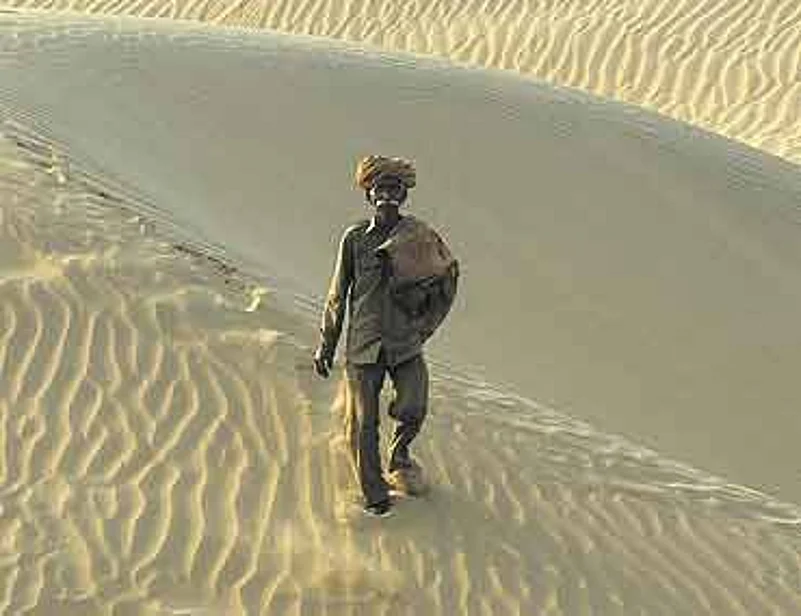
On other days, his khaki turban and uniform are his only protection against the desert's furies, the scorching summer winds and swirling sandstorms which turn him into a walking sandman. "Water is too precious to waste on washing, so I can only wipe my body. When I finish, there's a sand dune at my feet every evening," he says.
Till 2001, Khetaram was known as a 'delivery agent', operating in rural areas devoid of schools and primary healthcare centres. Since then, in somewhat belated recognition, India's three lakh plus delivery agents like Khetaram were accepted as Gramin Dak Sewaks (GDS), who constitute more than fifty per cent of the total workforce.
The frozen desert of Ladakh, the isles of Lakshadweep and the riverine communities of the northeast are all GDS territories. "The role of GDS is invaluable, since they deliver in interior areas that are often inaccessible by any means besides foot," explains Faiz-ur-Rehman, postmaster-general, Rajasthan Western Region.
Unlike the British postal system set up in India to relay company dak between administrative centres, after Independence, the mandate of India Post was to bring the entire population within the mailing ambit. Compared to 25,000 post offices in '47, today we have 1,55,618 offices throughout the country. To put this into perspective, China today has only 57,135 post offices.
Through the GDS, India Post has also been able to reach rural depositors, who entrust their monthly savings of Rs 10 and above to the post office. Currently, Somrad Branch PO has 80 operational accounts and the sum of deposits is Rs 3,20,232.
The essential criteria for GDS selection is access to another means of livelihood. They are required to work only five hours in a day and are also allowed to serve after the age of 60. All this is so that they can be paid a concessional sum of Rs 2,500-3,500 a month. Regular postmen get Rs 5,500 plus benefits. "Only by applying such different conditions could we retain a large force of 3,03,170 Gramin Dak Sewaks to serve remote outposts," explains Rehman.
Khetaram's appointment 15 years ago gave him a new lease of life. "Akaal or famine is a way of life here. In a good year, I get one crop of bajra.That can't feed my family of five. We'd starve without this job," he says. And for each family which resides in this arid land, survival is partly dependent on money orders remitted by a relative.
When writing about the social significance of the money order in his book, Story of the Indian Post Office, Mulk Raj Anand says: "In no other country is a poor man so dependent on the post office for transmission of small sums of money.... It reflects the absolute confidence which most Indians place in the post office." In fact, a few years ago, a scheme to scrap the GDS and transfer the job to patwaris (village record keepers) was proposed and summarily rejected. "We knew they would steal the money," says Budh Singh, a village elder.
Such aspects of trust make Khetaram a warmly received man. Unlike all other males of this community, Khetaram can dwell on any threshold, read out letters and write replies in his slightly shaky hand. Even if the women are alone at home. This, despite Rajput women being forbidden from venturing out of their homes even to fetch water.
His footfalls also dissolve other lines. Each day he crosses from Basia ka Tala to Nag Singh ki Dhaani, desert hamlets separated by an intraversible 3-6 km of caste barriers. For Khetaram, all differences vanish when Hira Devi, a Dalit, or Jor Bano, a Rajput, spare him a few sips from their scanty water pots.
"People are kind to me; the BSF always give me a lift. Since their camp came here last year, when I distribute their dak, I get a cup of tea." In the village, a piece of jaggery is all that can be offered when he brings news of a birth or weddings.
Nothing stays secret from him. "Look at Ber Singh," he says, pointing to a gaunt man in his eighties, lying on a rope-bed, beside the post box. Five years ago, Ber Singh's three sons went to Gujarat as labourers. Within months, their Rs 200 money orders turned into a trickle of Rs 50 before drying out fully. "I've seen hope dying in his eyes," says Khetaram, "But who can spare rotis, when there is no grain in their own homes?"
Far worse than witnessing life fading from the eyes of the old and abandoned, there's one letter delivery he dreads. The envelope with the right corner torn off, which signifies that the missive bears news of death. "Ashubh samachar cannot be carried into the house," says Khetaram. So he stands outside, reads out the letter twice, then tears it to bits. "Bad news must be destroyed," he mutters philosophically.
Today, after 15 years of bearing words across this desolate geography, Khetaram says his spine is strong. "I am grateful that as a Gramin Dak Sewak, I can serve after 60." He's waiting for the arrival of phone lines, now only 50 km away, for then he might become a Gramin Sanchar Sewak, when his duty will entail carrying a cellphone and the post, from home to home. "Main tayyar hoon (I'm ready)," he says, before striding off with his sack on his shoulder to deliver Panna Devi's dak before sundown.






















